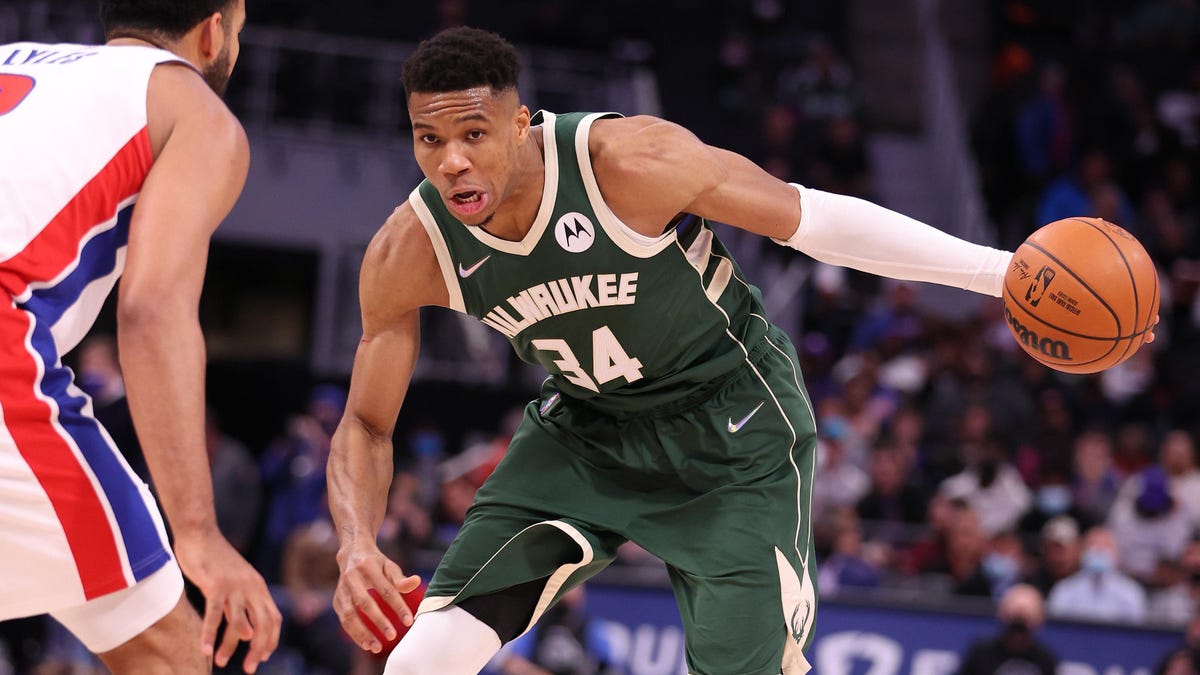Giannis may seem like body armor dunking a basketball, but he has some of the same mental health issues as others

That singular focus on greatness, nothing else matters, no price is too steep, and there is always more sweat to be poured into the workspace… it turns out is not healthy. For one, where does an obsession like that even come from? For Giannis Antetokounmpo it came from a place of fear.
The Milwaukee Bucks NBA Finals MVP is one of GQ’s Men of the Year. He revealed to Zach Baron that his obsession for greatness stems from this fear: “I don’t want to fuck this up.”
Antetokounmpo’s fear drove him to back-to-back MVPs, and to push through injury and dehydration to put up one of the best close-out game performances in the history of professional sports. But also, according to Antetokounmpo, the “stubbornness and persistence,” required to perform at that legendary level, “Sometimes it fucks you up.”
Baron wrote in the piece that Antetokounmpo talks to the Bucks’ sports psychologist every day about finding the balance to be who he is on the basketball court and still be present as father and simply another person in the world, not a superhero or the kid at the market in Greece, but someone who has feelings and deals with them honestly.
If there has been one positive from sports in 2021, it’s that we are all being forced to acknowledge that with athletes, and all people, mental health is health and if something is amiss it must be tended to the same as the flu or a twisted ankle.
G/O Media may get a commission
To be a person, performance is required. That’s why children are required to make presentations before the class in school. At some point the spotlight will be on them and they will have to deliver. Because of that, we can all relate to being nervous. For some, speaking in front of a group of people is the most terrifying task in the world. Hall of Fame forward Larry Bird once took an F, instead of making a presentation in class. Then the performance expands to activities, performances, debates, and athletic competition. There is certainly value in learning how meticulous preparation and repetition at performing can ease those nerves and the reward in the end can be worth all the struggle.
But what if after all the preparation and countless times of performing well the nerves get worse. As an adult the pressure is no longer about a grade or an accolade, but it’s about financial security and reputation. At this level it’s professional and one bad performance can ruin 50 good ones — how many career defining moments has LeBron James had? With all of that pressure on top of stresses outside of the playing field, sometimes that twisted ankle is the twisties and Simone Biles has to sit down at the Olympics.
It goes against all the overcoming adversity lessons that we’ve been taught by Gatorade commercials and celebrity interviews, but we’ve all seen people break. We cheer now because Britney Spears is no longer under a conservatorship, but don’t forget how she got there in the first place. All that hard work, performance, and attention; it eventually broke her.
Athletes, like many stars in popular culture, are introduced to the masses at a young age. That means behind the scenes, an even younger person has worked with a grown up intensity and attention to detail to develop a skill worthy to be admired before that person reaches legal drinking age. Then they achieve success, but have gone through their developmental stage with such tunnel vision that all of a sudden Naomi Osaka needs a break from being the best women’s tennis player on Earth.
Think about Antetokounmpo. He comes from a poor, migrant, close-knit family in Greece and then at 18 years old, he’s on his own playing basketball in America in front of NBA fans. Now, at only 26, he’s one of the biggest stars and finally achieved his goal of championship after being ripped for his postseason performance for years, has his family from Greece with him and now his own new family with two children of his own. To achieve all of that from a place of deep fear of blowing his chance, it should be logical that taking care of his mental health is a priority.
There will always be people too dense and envious to understand that an athlete or any celebrity having mental health issues is not weakness. Dave Chappelle and Michael Jordan walked away, so there’s no reason to castigate Biles, Osaka, or Calvin Ridley for taking some needed time to heal mentally.
Antetokounmpo, the 7-foot sculpture of a man who bricked free throw after free throw for three postseasons before breaking through with a 17-19 performance at the line to win a title, is telling you this life is hard on the pros.
There is certainly a price to pay for greatness but the price we see is the advertisement, the necessary time to spend in the gym and in the studio. What we don’t see is the fine print, that the total price is actually as much mental as it is physical.
For all the latest Sports News Click Here

